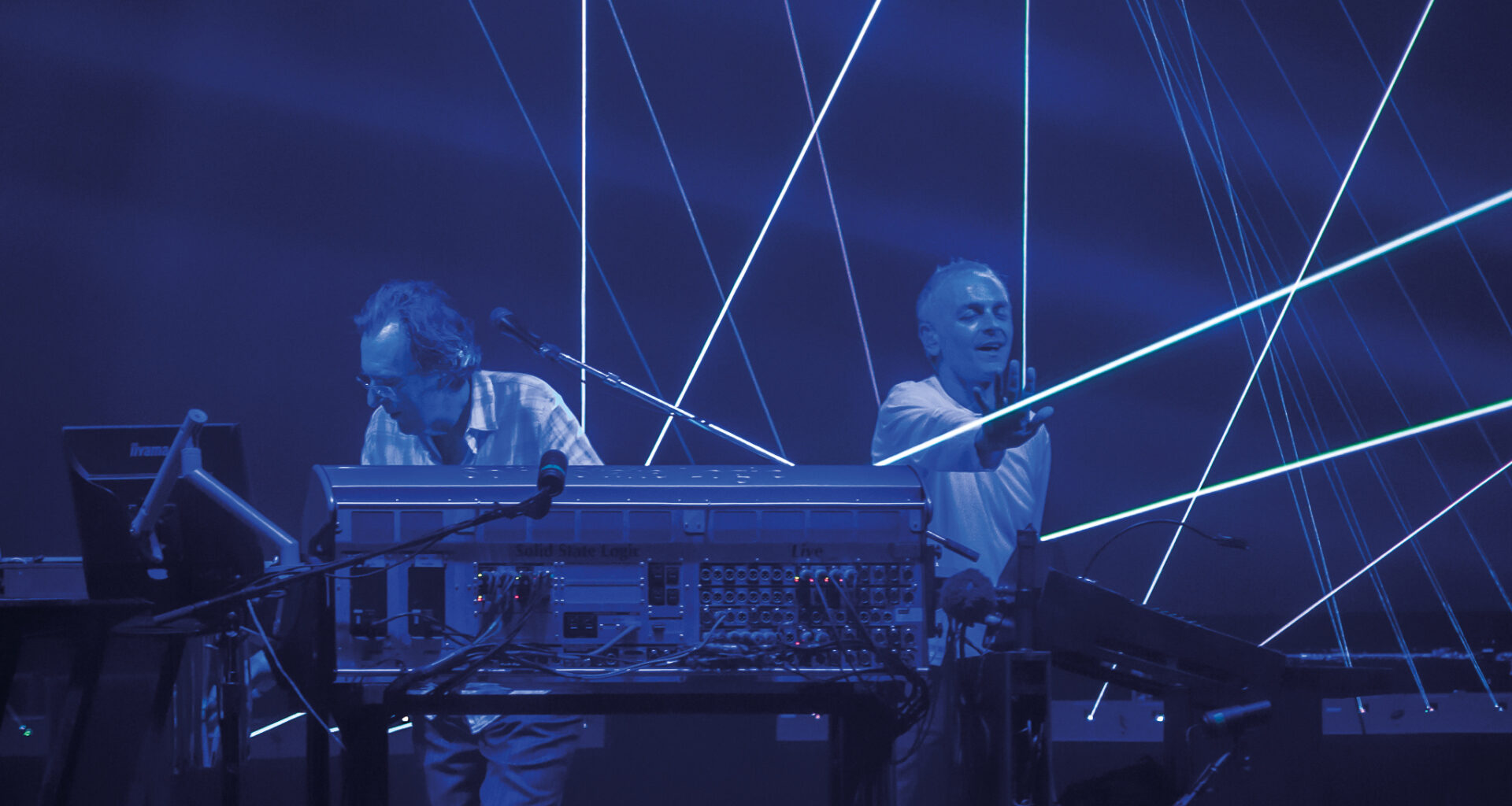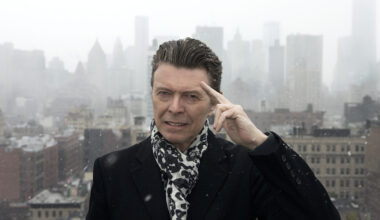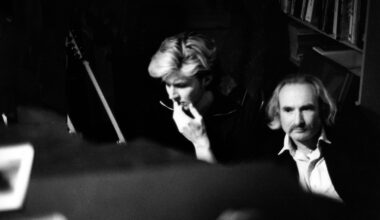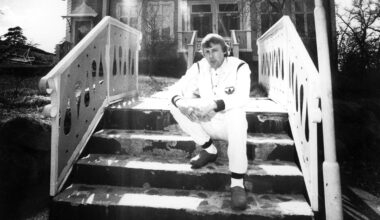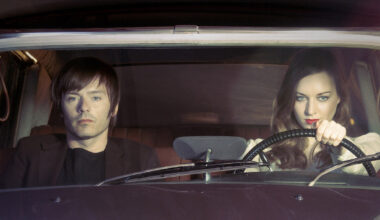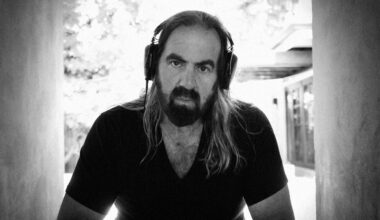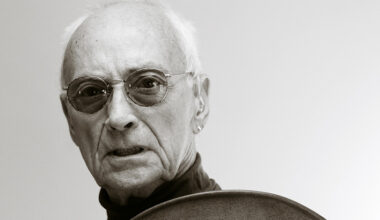In March, they played their biggest-ever headline show in front of 10,000 people at London’s Alexandra Palace. Entitled ‘The Surreal Carnival Experiment’, it blew the doors off any ideas of what a live show should be. But what did you expect? This is Underworld after all
“After the show I said to Rick, ‘This whole thing is happening back to front’,” laughs Underworld frontman Karl Hyde. “We’re supposed to have had all our success when we were young. By this stage in our career, we’re supposed to be playing the little pub down the road’.”
But normal rules do not apply to Underworld. We have, after all, just witnessed the band play their most ambitious headline show in their three decades of existence. London’s historic Alexandra Palace venue sold out of its maximum capacity allowance of 10,400 tickets almost six months in advance. Considering their previous biggest headline show was only half that – 5,000 people at the Eventim Apollo in Hammersmith last year – and you can tell that there’s some kind of snowball effect beginning to happen.
“Well, Rick and I are amazed,” says Karl, speaking to us on the phone from Essex a few days afterwards, “and our agents and our promoters are amazed. We’re amazed that people are still discovering our music.”
It’s not hard to see why Karl Hyde and Rick Smith were attracted to the Alexandra Palace, a spectacular building perched on a north London hilltop above Crouch End. They certainly have a penchant for staging gigs in spaces that not only look breathtaking, but have their own sense of drama and totemic symbolism and significance in the common cultural landscape of the UK. When they were looking for a suitably grand London venue in which to celebrate the 20th anniversary of their classic and seismic “debut” album ‘Dubnobasswithmyheadman’ (we’ll come back to those inverted commas around the word “debut” later), the brutal modernism of the Royal Festival Hall fitted the bill perfectly. Likewise, their most recent shows in the capital were at the legendary Roundhouse in Camden, where Jimi Hendrix, The Doors and the Ramones had trod the boards, not to mention Aphex Twin and Spiral Tribe when squatters decided the place should be left abandoned no longer.
And yet the Ally Pally is in another league altogether. It’s a massive, hulking space that boasts a decadent palm court dating back to its opening in 1873 and a main hall that is dark and long (sorry), with more than a touch of the grimy warehouse of acid house days about it. All that and also astonishing views of London’s pulsating, illuminated 21st century skyline, from the London Eye to the towers of Canary Wharf. Surely, we put it to Karl Hyde, this is why tonight they choose to open their set with a pumping and powerful rendition of ‘Mmm… Skyscraper I Love You’ from ‘Dubnobass…’
“Honestly, that’s the first time I’ve heard anyone say that,” he replies, before adding somewhat mystically, “It’s just a coincidence. But then there are a lot of coincidences around what we do.”
Alexandra Palace has plenty of atmosphere then, and also plenty of space. Plenty of space for Underworld to put on their most adventurous production yet in conjunction with Tomato, the design, lighting and visuals company they set up in the early 1990s. They’ve really gone to town for this one-off performance, which they’ve dubbed ‘The Surreal Carnival Experiment’. They say that it celebrates “the meeting of the group’s past, present and future”.
There’s definitely a carnival vibe in the air, as stilt walkers make their way precariously around the hall. In the palm court, people are gathering around multiple screens and are recording short video loops of themselves that immediately appear on the screens above and will later be beamed onto the Ally Pally’s back wall while we await the band’s arrival on stage.
Undeniably the best gimmick – which is probably underselling it by far – is that from the moment the doors open at 7pm, Rick Smith is DJing behind the sound desk in the middle of the hall at the foot of a 50-foot-high, four-sided tower made of fabric with huge psychedelic visions being projected onto it. It’s a great trick, because as people walk in, potentially expecting to wait to catch a glimpse of their heroes, they discover Rick is already in action. You can see people motioning to their friends to come over, pointing to the figure behind the mixing desk and mouthing, “It’s him! He’s on already!”.
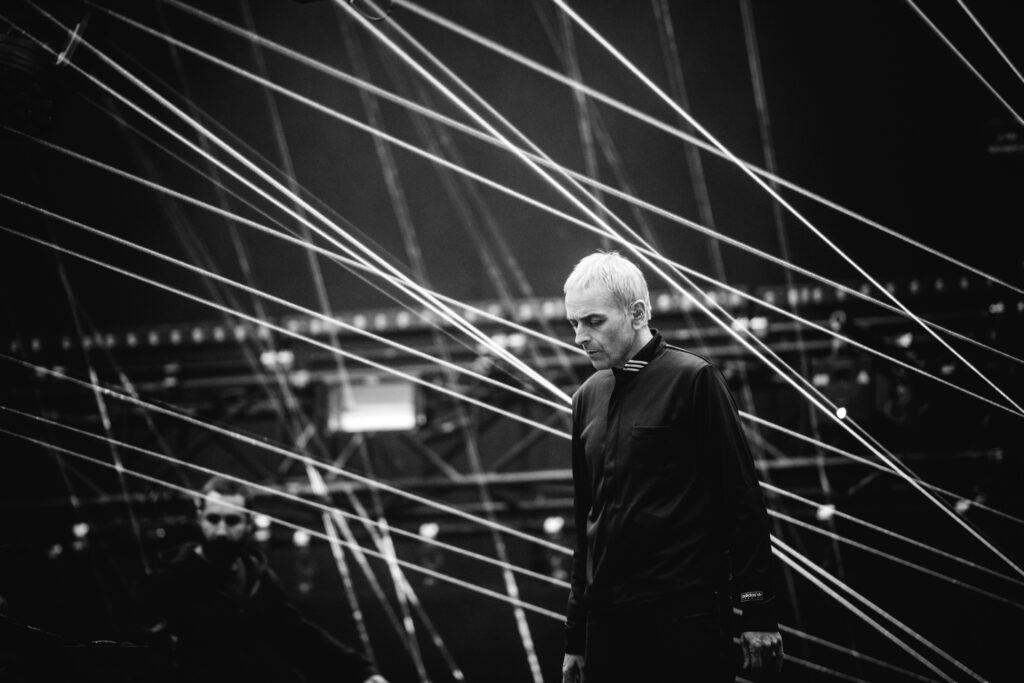
This self-styled performance-come-installation features tracks from across the Underworld back catalogue being “deconstructed and re-conceived”, along with new and improvised work written specifically for the show by Rick. It’s something he has been wanting to do for years, to “build an atmosphere to a gig, make the show the whole evening”.
He starts with tinkling pianos, oozing strings and a disembodied voice talking in the distance, slowly manipulating the mood into beautifully wonky, Kraftwerk-style grooves and synthpop stomps. There are variations on Rick’s ambient ‘Bungalow With Stairs’ project and a live take on ‘Downpipe’, the 2009 floorfiller Underworld did with Mark Knight and D Ramirez.
Those who know their history will realise that this also harks back to early 90s Underworld, when DJ Darren Emerson was a member of the band and they embarked on their Experimental Sound Field shows, a series of expectation-shattering live sets. From a much celebrated 18-hour hour session at Glastonbury in 1992, through to the last Experimental Sound Field in Burgess Park, south London, a year later, they would occupy a cage/stage in the middle of a space, quadrophonic sound whizzing around them. It was this period that saw the group, who had already released a couple of more pop-slanted albums without much success, morph into the beast of what is often called Underworld MkII. It’s this version of the band that started life with ‘Dubnobass…’, hence the inverted commas around the word “debut” earlier.
These performances were not only dazzling, they also helped pushed the boundaries of live electronica that has since grown to be one of the most significant musical developments of the last 25 years. This, Karl remembers, was when the line between DJ and live performer blurred tantalisingly. They would improvise on top of DJ sets and Karl’s stream of consciousness vocals would then suddenly and unexpectedly join the mix.
“I remember a meeting we all had,” he says, “where someone referred to ‘the DJs and musicians’ and people were saying, ‘Hang on, aren’t DJs musicians as well?!’.”
Back in Ally Pally, the mood is slowly being shifted and the cavernous hall is steadily filling up, some of the big screens showing black and white images of the building itself. Shot by Tomato’s Simon Taylor, there are grainy close ups of the swaying palm trees and the textures of gnarly stone exteriors. Karl, who accompanied Simon on a tour around the venue well in advance of the show, recalls being blown away. “Simon was allowed loads of access,” he says. “He went right into the catacombs of the building.”
For Karl, the most poignant moment of the tour was being ushered into a small room in the depths which had been used as the world’s first television studio when the BBC made its early TV broadcasts from there.
“For me, that was very moving, thinking of myself as a small child sat on my grandmother’s carpet watching things like ‘The Woodentops’ and ‘The Flower Pot Men’, which would have come from this extraordinary room,” he recalls. “I’m a huge fan of the BBC, it’s been deeply central to my career, from discovering John Peel, listening under the bedcovers, right through to now. Wherever Rick and I are in the world, you can usually find us tuning in to 6 Music or Radio 4. Long may it last. It’s still a really encouraging home for the maverick.”
Elsewhere in the venue, screens show Karl in a paint splattered T-shirt daubing words, lots of them, all round a tiny room. Phrases like “sound of metal”, “inky fingers”, “never hard”, “let me in”, “short in winter” and hundreds of others fill the space while Karl paints at speed, a rather mad look in his eyes. These shots were taken in Tokyo last year, where the duo first tried out their Street Poem concept, which is due to have its British premiere when it visits Manchester this summer.
Manchester’s Street Poem will spotlight the stories of the homeless in the city, giving them a rare voice in a world where they are too often marginalised. The work is both “fleeting performance and compelling installation” as Karl covers the walls of the venue with words and phrases drawn from the streets, and the space fills out with a powerful soundtrack built on snatches and fragments recorded by Rick all over the city.
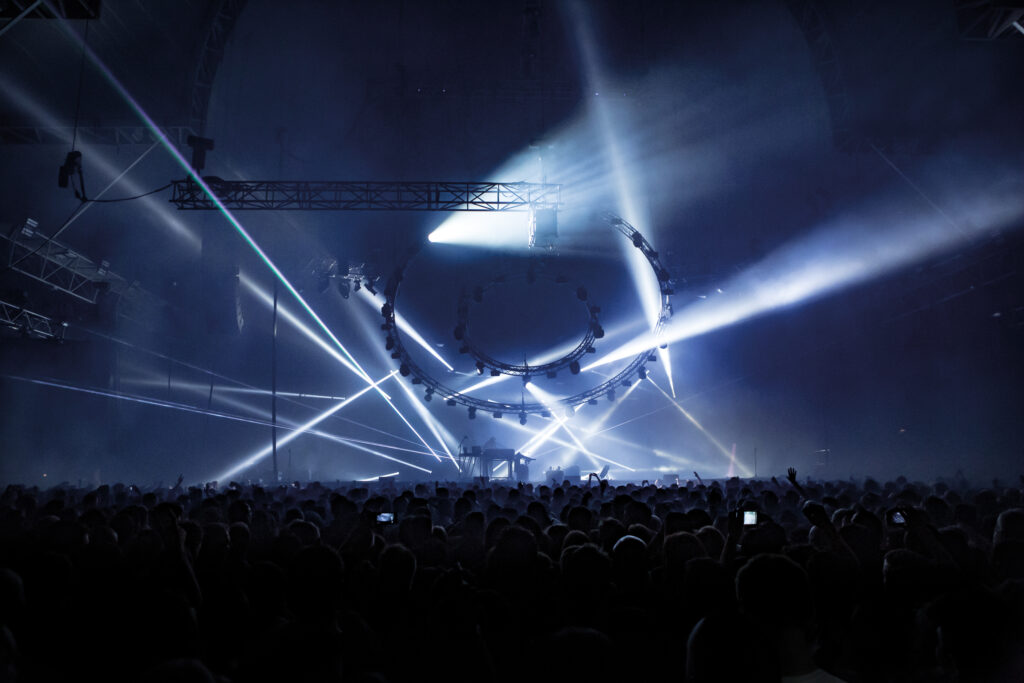
It’s a project that Karl is clearly very proud of, not only for its social ramifications but also for the creative opportunities it throws up. Words are absolutely central to the Underworld experience, from the ‘lager, lager, lager’ catchphrase from ‘Born Slippy’ that they’ve become synonymous with, to the rhythmical phrases (“I would like a cup of coffee / I need a drink”) that Rick developed to help direct the huge army of drummers at the London 2012 Olympics opening ceremony. The fragments of stories we’re watching being painted seem to have an everyday quality about them.
“Well, people say the most beautiful and simple things,” notes Karl. “And words do sound great as lyrics next to music. The great thing about this project is that we don’t often have an opportunity to let other voices come in and hijack what we’re doing.”
As Rick’s set draws to a close, the fabric walls of the tower drop dramatically to the floor and the band are finally ready to hit the stage. When they arrive, they can hardly believe their eyes, taking in the huge crowd and embracing each other in disbelief as ‘Mmm… Skyscraper I Love You’ opens up the set. It’s a stunning performance with an equally jaw-dropping production to go with it. Tomato have eschewed the normal rock ‘n’ roll logic to light the whole front half of the hall rather than just the stage. It certainly makes people feel included, rather than shut off from their heroes.
‘Juanita’ follows, but their next move is a sign of this late-period Underworld, not happy to simply bash out their big hits and the four-to-the-floor techno that they are best known for. ‘I Exhale’ arrives with its big, glittery glam rock boots on, sounding every bit like Underworld doing The Fall doing The Glitter Band. Taken from their seventh studio album, ‘Barbara Barbara, We Face A Shining Future’, it illustrates more than anything in the set tonight the band’s refusal to conform to well worn formulas and how they continue to throw spanners in the works. Karl admits that there are those who want them to revert to type, but that’s not really an option for them.
“Back in the 90s,” he says, “the whole trance thing, the long tracks and the improvisations, I think they were a reflection of the chemical reality that a lot of people were living in. Our approach then was very much rooted in improvisation and we had a big love of people like Miles Davis. I know that some of our hardcore fans would still like us to do that. But to be honest, I think if we did, a lot of other people would get bored!”
Indeed, as tonight’s 18-track set shows, Underworld have worked hard to hone a well paced and dramatic event that keeps on surprising. For instance, they instinctively know to drop the more sumptuous and relaxed sounding ‘Cups’ halfway through the set as respite before the second half hurtles towards a more crunchy climax. Karl has developed into a much more upfront frontman too, crotch thrusting, hip swinging and face pulling. He’s still unpredictable though, one minute asking everyone what they’re up for tonight, the next dropping the rather untypical observation that “Time is a cocker spaniel… Time is a potato in a fish and chip shop”. We’ll have some of whatever he’s on please.
‘King Of Snake’ is, as ever, one of the set’s highlights, especially with green fragments of light spraying around the room, but for full-on emotional impact there’s only one song to finish off the gig. As the now infamous chords of ‘Born Slippy’ hit, there isn’t a pair of arms in the room that aren’t up in the air. And then, as Karl and Rick embrace once more, they’re off with another legendary moment in their crazy career beneath their belts.
‘Born Slippy’ and its use in ‘Trainspotting’ are obviously key in the band’s development. The new version of the anthem that came with ‘T2’, all slow and slurry, was all Rick’s work and took Karl by surprise. “I found that incredibly moving,” he admits. And it’s this ability to continually entertain each other, as well as the very talented people they work alongside, that has kept Karl Hyde and Rick going for all this time. “It’s collaboration,” says Karl. “Simple as that.”
The week following the show, the pair were due to head off on a mini world tour. And while some bands might find that a tiring or overwhelming experience, Karl is looking forward to a concentrated amount of time with his writing partner.
“It’s always been the way with us that we’ll end up writing lots of stuff together in hotel rooms,” he says. “I like the fact we’ll be able to do a bit more of what we used to, like just wandering off into the outback together when we have a chance.”
The Genesis of ‘The Surreal Carnival Experiment’
Rick Smith talks us through Underworld’s live spectacular, from the seeds of the idea to the day of the show itself.
“It’s not that I’m always unhappy about what we’ve done, I just can’t help but think that we can do better. I don’t look back too much, I tend to think, ‘What can we do next?’. The idea came around the same time the tickets went on sale. The speed with which the show sold out was a surprise. I thought, ‘These people really want to see us, we owe them something special’. I suppose we wanted to try and go beyond what they imagined we might do.
“Largely, what we do is we play festivals and dance events. ≠This felt like something different in that it was 10,000 people who all wanted to see Underworld. That in itself was inspiring, so I just followed my nose. You chase the experiment internally and that’s how it starts. You open up a conversation with the team, look at what you felt were successes previously, think about how to empower the extraordinary people that we work with and draw others in… ensnare them.
“‘Surreal Carnival’ was initially just a working title, so rather than a themed, theatrical event where everything needed to tie into a central idea, it was more like an explosion of that idea, a bit like “Look! Bumper cars, there’s the tallest man in the world, there’s the smallest dog”, and then it could all belong. It quite quickly became an idea of a container for potentially disparate ideas and that somehow it would be possible to connect them all.
“The venue itself was, well, a bold choice. We went to do a site visit last autumn, it was a beautiful sunny day and we were knocked out by the views over London, but most of all by the possibility of what we might be able to do there… while not really quite knowing what we would do. And that’s when the ideas started to form.
“I arranged to go back there to see the place when there was a live event on and that was kind of sobering, in a good way. It made me realise I didn’t want to put on the equivalent of an indoor festival. I wanted to make people feel special, comfortable. We started to use the expression “network the building”. It’s so large and there’s so many interesting spaces, I felt we needed to connect them so that wherever people were, they still felt part of something special. So if they need to go to the toilet, they feel that the journey to the toilet is really interesting… that’s a terrible quote, isn’t it?
“From start to finish, it must have taken about five months, which is remarkable given what else was going on. It became a bit of a challenge inevitably, mainly because ‘T2’ was my priority. My work life got a bit tricky in the late autumn.
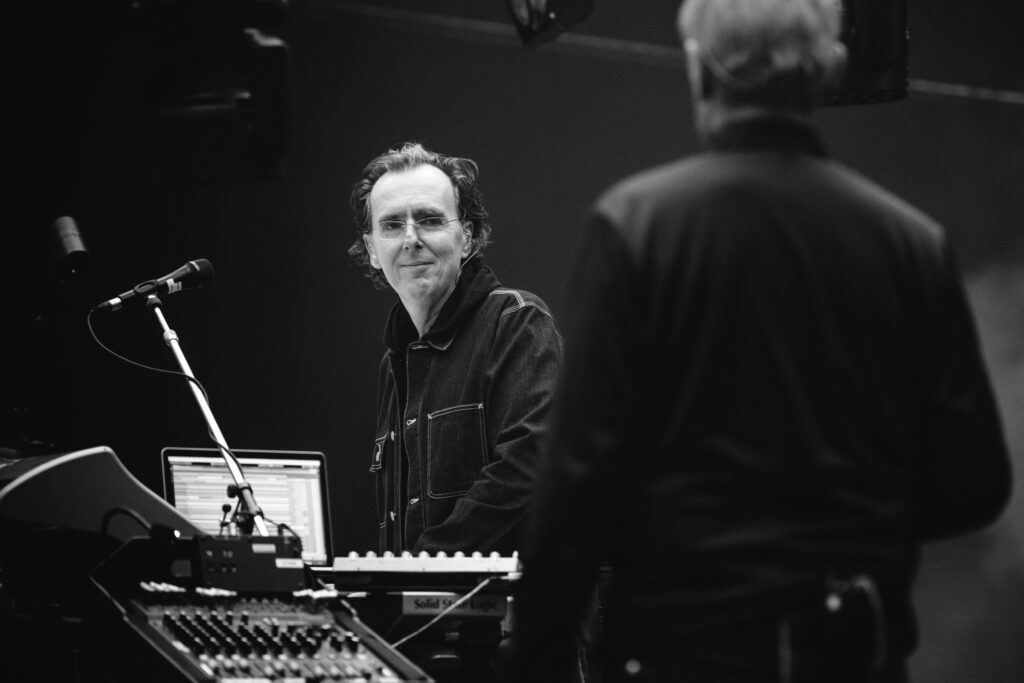
“The day of the show was really interesting. Unlike the Olympics, where a huge part of my job was already done so you end up just watching events unfold, I still had a lot to do on the actual day itself. To see all the production elements come together, to watch the trucks arriving with the things that we’d talked about for months, and the lighting rig going up, and teams of people laying cables and assembling something out of nothing, that was very exciting.
“We had no idea how the tower in the middle of the main hall, which was the focus of the show before we went on, was going to come together. Everything was completely improvised and in good form my desk broke during the very first track, which was kind of perfect. But we got it fixed very quickly. That was my little reminder to take nothing for granted.
“The audience themselves turned up early in droves to experience the event. They have an almost tangible energy and affection, it was so warm. It’s still such a beautiful surprise every time it happens.
“Did I enjoy it? Yeah, I categorically enjoyed it. Want to do it again? Yeah, but I’m not saying we’d literally play the Ally Pally like that again. It’s a journey, so it’s a bit like saying, “Are you going to take another step?”. Yes, absolutely. Absolutely.”
